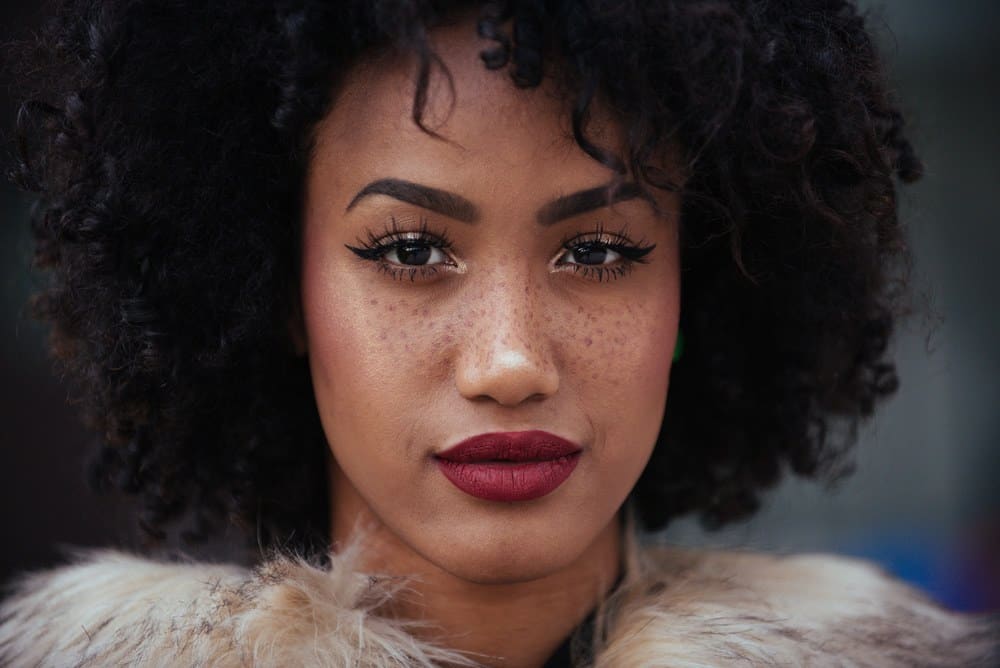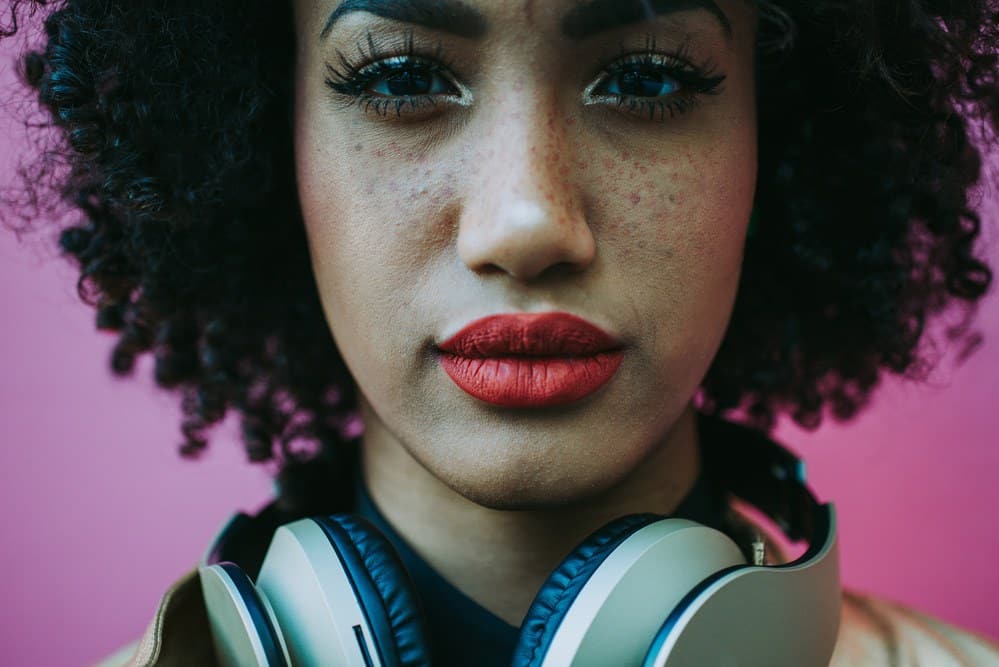
Essential oils such as cedarwood oil are one of the great go-to beauty items within the Curl Centric community.
With that in mind, let’s look at the science and see what cedarwood oil can actually do for your hair and scalp.
Table of Contents
What Does Cedarwood Oil Do for Your Hair?

One of the primary areas where cedarwood has seen consistent success is alopecia areata, an autoimmune condition that can lead to significant hair loss.
It affects as many as 7 million people in the United States alone.
A 1998 study first reported in Archives of Dermatology explored cedarwood’s effectiveness in treating alopecia areata.
It was designed as a randomized double-blind study that was conducted over a period of seven months, with follow-ups at three and seven months during the course of the study.
86 patients who had alopecia areata participated in the study, and they were divided into two groups.
One group was given carrier oils only and served as a control group of sorts, while the second group was given an assortment of essential oils, including cedarwood.
In the end, 19 of the 43 patients given the essential oils displayed improvement, compared with only 6 in the control group that was given a carrier oil.
As demonstrated above, cedarwood oil is one of several essential oils that can help with hair care, including rosemary oil, thyme oil, ginger oil, lemongrass oil, and lavender oil.
Each of these essential oils has its own pros and cons. One of the biggest upsides of cedarwood over others is its uniqueness – you’ll find plenty of products with lavender and rosemary, but fewer with cedarwood.
Also, like most essential oils, one of the biggest benefits cedarwood oil can give your hair and scalp is reducing the amount of dryness.
It has also been known to reduce the amount of flakiness, which in turn can reduce the degree of dandruff in your hair.
Like many essential oils, it can stimulate circulation in your scalp, which can help stimulate hair growth.
Cedarwood is good for skin overall, being rich in Vitamins A, B, C, and E. It can also help balance out the amount of oil on your scalp.
Nobody likes having a greasy, oily scalp, and that certainly does no favors for your scalp’s health, so this can be beneficial for your hair’s texture and appearance, as well as its overall health.
In comparing cedarwood and rosemary oil, rosemary can be better for reinvigorating damaged hair follicles, while cedarwood is good for combatting hair loss.
The Benefits of Cedarwood Oil for Hair Growth

1. Combat Head Lice and Other Insects
Before you can start thinking about enjoying luscious locks, you first need to make sure you don’t have any creepy crawlies calling your head home.
That may sound gross, but anyone who’s ever had to deal with head lice or worse can tell you about the problems associated with an insect infestation.
Your hair is vulnerable to a wide range of insects, including:
- Lice: By far one of the most common insect invaders for heads of hair, lice can feed on mammals’ blood – including that of your scalp. While they can live in carpets, they need hosts to survive, and once they get comfortable, they can be hard to root out of your hair, especially after they’ve laid their eggs.
- Chigoes: This member of the flea family is common in the Southern United States and can burrow into hosts’ skin.
- Botflies: These flies are large, fuzzy, either black or grey, and like to lay their eggs in areas where there are plenty of mammals. This is another species that can burrow under your skin, including your scalp, and can cause infections and skin irritation as well as allergic reactions if left untreated.
- Chiggers: These mites are common to the Southeastern United States and burrow into their victims' skin.
A study done by Cornell University found that cedarwood oil is an effective means of warding off mosquitos. Another study done in 2014 and published in Environmental Entomology revealed that cedarwood oil is effective against ticks and ants.
Given how bad each of those pests can cause your skin condition to be, it’s no surprise why cedarwood oil, with its insect repellent properties, is an increasingly-popular additive in hair care products.
2. Lessening Anxiety

As mentioned, stress is a major cause and exacerbating factor when it comes to hair loss. You probably already know that, which is why you’ll want to do whatever you can to lower your stress level.
Unfortunately, “lowering your stress level” is easier said than done, which is why the soothing ability of essential oils such as cedarwood is so important.
Several studies have been done on the efficacy of essential oils as calming agents.
These studies have demonstrated that the aromatic qualities of essential oils, in particular, can have a positive impact on your psyche, soothing you and calming you down and therefore helping to relieve stress.
Of course, these aromas aren’t for everyone, but if you’re someone who enjoys the scent of cedar (i.e., sweet and woody fragrance), a bit of cedarwood oil (or wood oil) can help ease your stress and thus lessen that potential cause of hair loss.
3. Anti-Inflammatory Properties

Just as problematic for your skin and hair as anxiety is inflammation. A 2017 study found that cedarwood oil is an effective anti-inflammatory.
Cedarwood is typically safe to the touch, so you shouldn’t have to worry about further irritation. That said, you shouldn’t use cedarwood oil if you are indeed allergic.
4. Antimicrobial and Antibacterial Properties

If you don’t want insects crawling around and laying eggs in your hair, you certainly don’t want skin-ruining bacteria and microbes making themselves at home there, either.
There are a variety of different bacterial infections such as folliculitis and general scalp infections that can cause both your scalp and hair to degrade and potentially cause your hair to fall out altogether.
Cedarwood oil contains antimicrobial properties, which can help contain skin outbreaks such as acne and eczema when they occur on your scalp.
5. Cedarwood Oil Can Help You Sleep

If you think sleep and hair loss are unrelated, think again. Sleep deprivation may not cause hair loss per se, but the added stress it can put on your mental state and body can cause hair loss.
Once again, cedarwood oil can help in this regard. Study after study has demonstrated its efficacy in helping with sleep issues, and both cedarwood oil and lavender oil are favorites among those looking for aroma-based sleep remedies.
6. Dandruff Assistance

One consequence of dry skin is an increased amount of dandruff. As the scalp dries out, it starts to flake, causing a bit of dandruff to flutter down and the top of your head to become quite itchy.
This then typically results in people scratching that itch, dislodging still more hair follicles and dry skin, causing more dandruff and thus setting the whole cycle in motion all over again.
Dandruff is one of the most common hair problems, and cedarwood oil can help you manage it.
As mentioned, it helps soothe dry skin and manage bacterial buildup, which can help alleviate the conditions that cause dandruff to occur.
7. Fragrance and Beauty
Hair care is about more than simply making sure your scalp isn’t dried out or infested with insects or bacteria.
Hair maintenance can be hard work.
One of the reasons we put up with the arduous hair care regimen that proper hair care demands is because we want a head of hair that’s as bold and beautiful as it is full and healthy.
As alluded to above, cedarwood oil, like other essential oils, is quite fragrant. If cedarwood’s distinct scent (i.e., cedar tree) appeals to you, cedarwood oil can allow you to imbue your hair with that pine-fresh fragrance.
Add to that the fact that cedarwood can help make your hair shinier, and it’s no wonder why it’s becoming a popular inclusion in all manner of beauty-focused hair care and skin products.
How to Use Cedarwood Oil for Hair Care

Depending on where you live, cedarwood oil may be hard to find in a supermarket, though you can find it with ease at specialty stores and countless outlets online.
One of the most important things to keep in mind when using cedarwood (or any other essential oil used for hair care, for that matter) is that a little goes a long way.
These oils are quite potent, so you don’t need to slather them on your scalp – on the contrary, doing so is a fast way to severely irritate and perhaps even burn your scalp. Instead, a couple of teaspoons should suffice.
You can apply the oil after you have already washed your hair as you normally would. However, there’s also nothing wrong with mixing it in with your shampoo and applying it all at once to save time.
If you massage it into your scalp, you’ll want to make sure you really rub it in to ensure that your scalp is getting the most of it.
However you choose to apply it, you’ll first want to make sure you dilute it down to a safe ratio. Again, you shouldn’t be using more than a couple of drops’ worth.
So if you are mixing it in with your shampoo, you’ll need to make sure that the ratio is correct. Add the drops and shake the mixture to combine the oil with your shampoo.
History of Cedarwood Essential Oil

As the name would imply, cedarwood oil comes from cedar trees, which cover a wide range of natural conifers and similar trees.
This is one of the most intriguing yet potentially confusing aspects of cedarwood since, unlike other essential oil options, it is not directly connected to a single plant or substance.
There are many types of cedar trees and pines, and many of them can theoretically have their bark harvested for cedarwood oil.
As with many other essential oils used for hair care, cedarwood has seen ritual use since antiquity. The use of cedarwood dates back to the Ancient Egyptians
Cedar is also referenced throughout the Bible, and cedar and pine trees throughout North America served as an inspiration to a wealth of different Native American religious and cultural traditions.
- How to Use Coconut Oil for African American Hair
- How to Make Scalp Smell Better
- Clary Sage Oil Benefits for Hair
- Safflower Oil Hair Benefits
When applied properly, cedarwood oil can make a big difference in the health of your hair and scalp.
It can help relieve irritation and itchiness, combat potential causes of hair loss, and give your hair a sleeker and more fragrant aura.
All of this combined helps make cedarwood oil an enticing all-natural skin and hair care option.




